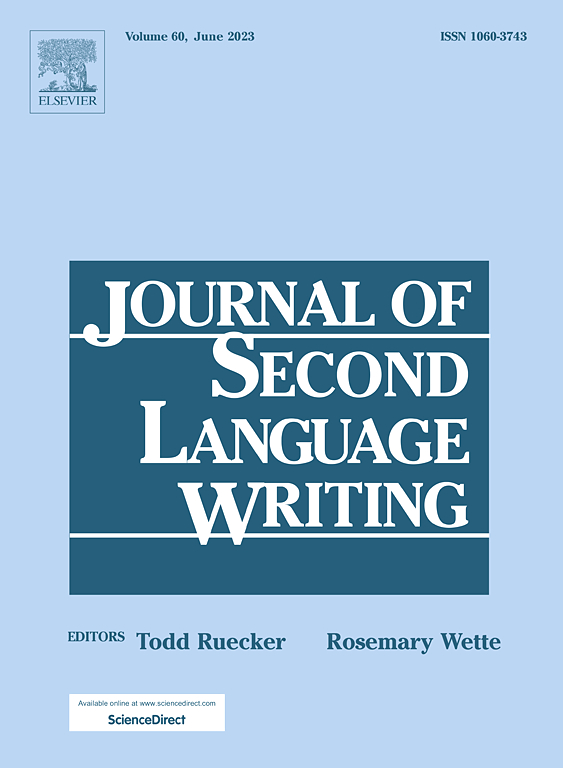Tracking the development in second language writers’ use of academic vocabulary in discipline-specific assignments
IF 4.5
1区 文学
Q1 LINGUISTICS
引用次数: 0
Abstract
Few longitudinal studies have examined the development of second language (L2) writers’ use of academic vocabulary in discipline-specific assignments. This study tracked the use of expert vocabulary and proficient novice vocabulary in assignments written by 230 L2 writers across two semesters of postgraduate study in Education and Engineering programs. Gardner and Davies’s (2014) Academic Vocabulary List (AVL) and Malmström et al.’s (2018) Productive Academic Vocabulary List (PAVL) were used to represent each kind of academic vocabulary respectively. Linear mixed-effects model analyses found that Education students used significantly more AVL words in Semester 2 than in Semester 1, but no significant differences were found in the case of Engineering. This indicates that Education students tend to use more expert vocabulary as they progress further in their academic study, but Engineering students did not. Students’ use of proficient novice vocabulary does not appear to change across semesters in either discipline. Analysis of the writing of individual students largely supports the findings of the group analysis, but also revealed that lexical development patterns varied depending on individuals. Together these findings demonstrate the complex nature of vocabulary development.
追踪第二语言作者在特定学科作业中使用学术词汇的发展
很少有纵向研究考察了第二语言(L2)作者在特定学科作业中使用学术词汇的发展。本研究追踪了230名教育与工程专业研究生在两个学期的写作任务中专家词汇和熟练新手词汇的使用情况。分别使用Gardner and Davies(2014)的Academic Vocabulary List (AVL)和Malmström et al.(2018)的Productive Academic Vocabulary List (PAVL)来表示每一种学术词汇。线性混合效应模型分析发现,教育专业学生在第二学期使用的AVL词汇显著多于第一学期,而工程专业学生使用AVL词汇的差异不显著。这表明,随着教育专业的学生在学术学习上的进步,他们倾向于使用更多的专业词汇,而工程专业的学生则没有。学生对熟练新手词汇的使用在两个学科的学期中似乎没有变化。对学生个人写作的分析在很大程度上支持了群体分析的结果,但也揭示了词汇发展模式因个体而异。总之,这些发现证明了词汇发展的复杂性。
本文章由计算机程序翻译,如有差异,请以英文原文为准。
求助全文
约1分钟内获得全文
求助全文
来源期刊

Journal of Second Language Writing
LINGUISTICS-
CiteScore
8.80
自引率
13.10%
发文量
50
审稿时长
59 days
期刊介绍:
The Journal of Second Language Writing is devoted to publishing theoretically grounded reports of research and discussions that represent a significant contribution to current understandings of central issues in second and foreign language writing and writing instruction. Some areas of interest are personal characteristics and attitudes of L2 writers, L2 writers'' composing processes, features of L2 writers'' texts, readers'' responses to L2 writing, assessment/evaluation of L2 writing, contexts (cultural, social, political, institutional) for L2 writing, and any other topic clearly relevant to L2 writing theory, research, or instruction.
 求助内容:
求助内容: 应助结果提醒方式:
应助结果提醒方式:


